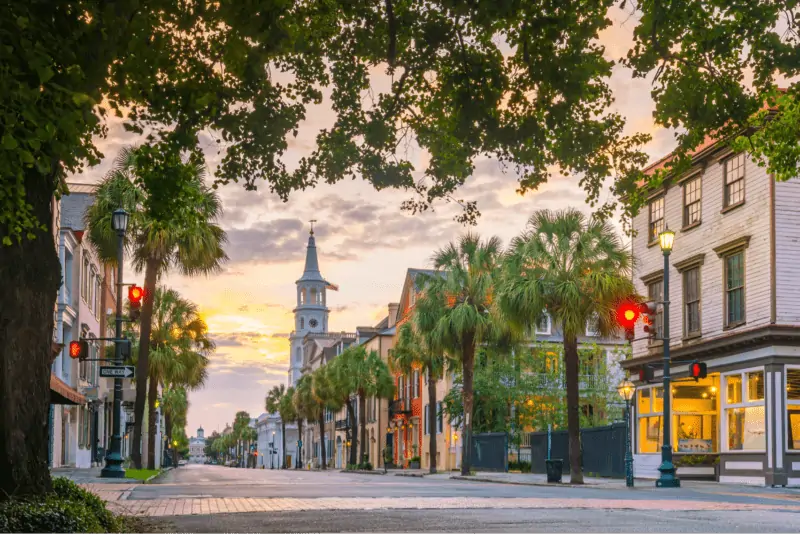South Carolina Airbnb Laws and Regulations – Current Updates and Requirements
Airbnb and short-term rental regulations in South Carolina have evolved as local governments attempt to find the balance between encouraging tourism and maintaining neighborhood integrity. While regulations can vary widely across different cities and counties, the state as a whole reflects the broader national trend of adapting and growing alongside the short-term vacation rental industry. Below we outline the intricate landscape of short-term rental rules in the Palmetto State.
If you have questions about short-term rentals in South Carolina, contact Proper Insurance. Our agents are experts in the vacation rental industry. Call 888-631-6680 today.
Most hosts unknowingly have the wrong insurance for short-term renting—don’t wait until a claim to discover your coverage won’t respond! Schedule a quick 15-minute review to verify your protection and gain peace of mind for your property, liability, and business income.

Beaufort, South Carolina
6% Cap for STR’s in the City
Beaufort has decided to put a 6% cap on Short-term Rentals (STRs) to limit the number in each neighborhood. Once the cap is hit, no more permits will be given out. To become a legal STR in the city, hosts must first pass the zoning inspection of the application. They then must provide the following and abide by the regulations. To learn more, visit The City of Beaufort’s website and STR application.
The following laws and regulations are in place:
- License: Must obtain a business license from the city
- Permit: The host must obtain a permit from the city, and it must be displayed on all short-term rental booking platforms
- Minimum Stay: Guests must stay two nights at a minimum
- Occupancy: The max occupancy is two people per bedroom plus two additional people
- Parking: Rentals must accommodate off-street parking with clear signage and appropriate surfaces such as pavement or gravel
- Contact List: Must provide a list of contacts in case of an emergency, including the police non-emergency number
- Zoning: Restrictions for where STRs can operate. Also, STRs are prohibited in the Point neighborhood, as shown on this map
- Safety: In order to obtain a permit, hosts must provide a copy of their fire alarm monitoring contract and pass a safety inspection
Charleston, South Carolina
Charleston, S.C. bans whole-house short-term rentals
Officials in Charleston have growing concerns about short-term rental listings in the city. The lack of available space in downtown Charlestown has led to increased costs and its unsure how rentals will affect that. The concerns are large enough that the city has created a “short-term rental task force” to help regulate the rentals. Aside from the task force, the city recently updated its Airbnb laws and regulations. Short-term rentals (STR) of whole houses are now officially banned in the City of Charleston.
Under the new ordinance, homeowners are required to inhabit the home while hosting short-term guests, and no more than four adults may occupy a short-term rental at once. The homeowner doesn’t have to physically be in the home at all times while guests are there, but at least one full-time resident must sleep there each night of the renters’ stay.
In addition, hosts must apply for and obtain a short-term rental license from the city’s Department of Planning, Preservation, and Sustainability. Any home that is not occupied full-time by its owner, as determined by property tax assessments, is not eligible for short-term rental licensing. This makes investment properties ineligible for STR permits. Portions of dwellings (e.g., duplexes) and accessory dwellings (e.g., carriage houses) on a property are eligible. All STRs must also have at least three parking spaces: two for residential use and one for guests.
The rules for short-term rental eligibility are based on location categories.
Aside from location eligibility, various defining regulations can be found below:
- The Residential STR shall be operated by the record owner of the subject property who shall also be a Resident of the subject property and who shall be residing overnight on the property while Residential STR guests are present; and
- The Resident owner shall comply with all business license and revenue collection laws of the City of Charleston, Berkeley County or Charleston County, whichever is applicable, and the State of South Carolina; and
- The Resident owner and the owner’s agent shall list the Residential STR Permit number on all advertisements, listings with booking services, and marketing materials, including without limitation, Airbnb, Vrbo, FlipKey, and any other online websites and listing or booking platforms or services.
- The record owner of the subject property must keep in full force and effect during all times the STR is operated, and have a general liability policy with a company authorized to do business in the State of South Carolina insuring against personal liability and property damage with limits of no less than $1,000,000 per occurrence.
It is important for hosts in Charleston to review current Airbnb laws and regulations in order to operate vacation rental businesses in accordance with City and State requirements.
Why It’s Important to Understand Liability Insurance
With the explosive growth of short-term rental properties found on websites such as Airbnb and Vrbo, communities are struggling to find common ground regulations. Many communities have already passed ordinances and laws with which all have some type of insurance requirement. However, simply stating “liability insurance” doesn’t accomplish much as there are three types of liability coverage one can purchase in the open market: personal liability, premise liability, and commercial general liability.
Too often personal and premise liability won’t suffice for short-term rentals as they both hold a business activity exclusion (i.e. short-term rental business). On the other hand, commercial general liability is readily available for purchase in the open market for short-term rental owners and provides coverage for business activity. When you hand your keys over to guests in exchange for payment, you’ll want to make sure you have the correct coverage for any accident that might occur relating to your business (dog bite, slip and fall, amenity-related injury, etc.).
Columbia, South Carolina
Enforces New Regulations in Order to Obtain a Permit
As of May 4, 2023 the City of Columbia requires short-term rental hosts to get a STR permit. The permit must be approved before renting out the unit. The application has a focus on guest safety. Anyone can get a rental permit if they have a place of residence or business office within 45 miles of the property. To learn more, visit the City of Columbia’s website and STR application.
The following regulations are in place:
- Safety:
- Swimming pool enclosures
- Structures are sounds and secure
- Handrails for four or more stairs
- Guardrails for decks over 30 inches above grade must be 34-38 inches in height with no openings
- Electrical service through public provider
- Electrical outlets within six feet of the kitchen sink shall be ground-fault protected. All other plates and switches shall be working
- Walls, floors, and ceilings shall not have any visual defects, mold, mildew, or holes
- The sink in the kitchen must have hot and cold running water
- The stove or range must be free from hazards
- Smoke detectors in every sleeping area, adjoining hallways, and one on every story of the home
- 2A10BC fire extinguisher that is fully charged every 75 feet apart on home
- And more please view the application here
- Parking: Two designated parking spots available and no parking on the grass in the front yard
- House Manual: Must provide a manual for guests that includes emergency contact numbers, the name and contact information for the owner or local representative, instructions or diagram of parking spaces, and the house rules
- Sanitation: Free from trash and debris
- Overgrowth: Grass and weeds must be less than 12 inches
- Motor Vehicles/Amenities: All vehicles must be operable and licensed
Florence, South Carolina
New STR Regulations in Florence, SC
The city of Florence, SC has implemented regulations to monitor the safety and growth of short-term rentals (STRs). Please visit the City of Florence’s Short-Term Rental Ordinance for more information.
The current regulations are in place:
- Permit: Must obtain a valid permit.
- Zoning: Must be in the approved zoning districts, RE, RS, RG, RU or NC.
- Owner Residency: The short-term rental must be operated by the owner who is a full-time resident of the property, with the property designated as their legal voting address and driver’s license address.
- Occupancy: The owner may rent out no more than two bedrooms.
- Guest Registry: The owner must maintain a detailed guest registry including guest information, party size, vehicle details, and arrival/departure times.
- Parking Restrictions: Motor vehicles may only park in driveways or on approved improved surfaces, with the total parking area not exceeding 25% of the front and/or side yard.
- Activity Limitations: Only lodging is allowed as part of the short-term rental, prohibiting events like weddings, parties, or conferences.
Greenville, South Carolina
Regulations Enacted as STRs are on the Rise
The city of Greenville has noticed growth in the home sharing economy. To keep short-term rentals (STRs) regulated they have decided to enact new regulations that monitor the zoning of STRs in the community. For more information on the STR regulations, please visit Greenville’s website.
The current regulations are in place:
- Zoning: Any property that is operating as a STR and renting out their home for less than 30 days must have a permit and be operating in a “General Lodging” zone. Homes being leased for more than 30 days (referred to as a mid-term rental) can be zoned in residential areas. See zoning areas here.
- Permit: Must obtain a valid permit and business license. For more information and to apply for a STR permit, click here.
- Taxes: Must pay accommodations taxes if providing short stay accommodations for 90 days or less.
Hilton Head, South Carolina
STR Regulations in Place
The city of Hilton Head, SC has taken steps to regulating STRs as the town has found an imbalance between STR units and residential housing. The adopted STR ordinance aims to manage the impacts of STRs on neighborhoods, the economy, housing stock, public facilities and quality of life for residents as well as visitors. For additional information visit the official Hilton Head Island short-term rental regulations and Airbnb laws.
The current regulations are in place:
- Permit: Must obtain a valid permit.
- Business License: Owner must obtain a business license.
- Fire Safety: Must have a fire extinguisher rated 2-A:10-B:C or higher in a visible location that is inspected annually by a licensed fire extinguisher vendor. House must be equipped with working smoking and carbon monoxide detectors in their respective places. House needs to have escape routes including two ways out of every room. For more information, please visit the Hilton Head STR Fire Safety Page.
- Owner Requirements: The owner must be available by phone 24/7 and on site within an hour of complaint.
- Parking: Must be at least 9 feet by 18 feet on improved surface.
- Trash: Must be stored in a place not visible from the street and taken out during designated times.
- Noise: The owner must notify guests in writing of the town’s noise regulations prior to any agreement. The regulations must also be posted prominently at the short-term rental.
Mount Pleasant, South Carolina
Mount Pleasant, S.C. plans to pass updated ordinance in January 2023
On August 30th, 2022, city officials in Mount Pleasant discussed potential updates to previous short-term rental laws and regulations. The goals of the changes are to establish two types of permit holders, define parking guidelines, and clarify the application process.
The implications of the proposal are listed below:
- Maintaining the previous cap of 400 short-term rental permits from the previous ordinance but making the distinction between part-time and full-time permit holders.
- Part-time permit holders must rent their place a minimum of 15 days without exceeding 72 days per year and pay a $250 application fee with an annual 4% tax on the property.
- Full-time permit holders pay a $500 application fee and can rent the property for more than 72 days per year with a 6% annual tax on the property.
- The violation for operating as a full-time short-term rental with a part-time permit will result in paying the additional $250 application fee.
- All permit holders must have a business license and pay all required taxes to the county.
Until these regulations are fully passed in January of 2023, the current regulations are to be followed:
- All STRs must meet the definition of a residential dwelling unit.
- The maximum number of permits issued each permit year shall not exceed 400.
- A copy of the neighborhood covenants and restrictions if requested.
Along with their annual application, hosts must submit the following items for review:
- Signed Property Owner Affidavit (a separate form for each owner)
- Copy of current homeowner’s insurance showing personal liability coverage and that the policy is in force
- Proof of property taxes paid
- Copy of ADU certificate of occupancy, if applicable
- Photo showing the location of required off-street parking for each short-term rental unit(s)
- Initialed, dated, and signed Short-Term Rental Fire Safety Criteria
- Link of all URL listings from all booking sites
- List of all sites used for advertisement
- Transaction History Report
Rock Hill, South Carolina
New Laws and Regulations
The city of Rock Hill aims to create a comprehensive plan for the welfare and future of Short-term Rentals (STR) by updating their Zoning Ordinance. Chapters four, eight and ten are specific to short-term rentals, but for the latest information on the laws and regulations of short-term rentals in Rock Hill, please visit their website.
The current regulations are in place:
- Permit: For stays less than 30 days, hosts must obtain a permit to operate as a STR. This must be valid and renewed annually.
- Max Bedrooms: Five bedrooms or less can operate as a STR.
- Business License(s): Both the host and owner, if not the same person, are responsible for paying for a business license.
- Taxes: Hosts are responsible for paying local accommodations taxes which are due the 20th of each month for the previous month.
Summerville, South Carolina
Summerville, S.C. is now allowing and regulating short-term Airbnb and Vrbo rentals
In 2020, Summerville introduced first-time Airbnb laws and regulations for short-term rentals. Previously, hosts went through an application for bed-and-breakfasts. City officials now agree new regulations are necessary to define short-term rentals as businesses and preserve the neighborhoods amidst the booming industry. A Short-term rental in Summerville will be defined as “The leasing or rental of an entire or extra dwelling unit by a permanent resident typically using a hosting platform in increments of less than one month.” Hosts are required to secure a business license and undergo a property inspection before renting to guests. This is applicable to hosts who operate in downtown mixed-use, urban corridor mixed-use, neighborhood business, and general business zones.
In addition to a business license and inspection, further Airbnb and Vrbo regulations are listed below
- All short-term rental hosts are required to have insurance.
- Hosts must maintain a peaceful environment for neighbors.
- Residential owners must reside on the property for at least 183 days a year.
- The property must be the owner’s official voting address, their South Carolina driver’s license address, and their 4% homeowners’ assessment ratio address.
- The resident must maintain at least 50% ownership of the property.
- Property owners in the general residential 3 and 5 zones will also need to apply for a special exception that needs to be approved by the town’s Board of Zoning Appeals.
How to Respond to New Airbnb and Vrbo Regulations
Cities across the US are integrating Airbnb laws and regulations as they realize the significance of short-term rentals (Airbnb or Vrbo) in their communities. Many neighbors complain of loud parties or cars coming and going at all hours. From an insurance perspective, there are indeed critical items to consider when operating a short-term rental business. Particularly whether you as the hosts have insurance to protect you and your business from accidents common in the hospitality industry.
The short-term rental ordinance in Summerville does not define the type of liability insurance required, however, here is a guide to the top questions to ask an insurance provider in the short-term rental space.
Proper Insurance requires an advanced level of care for your property to ensure a pleasant and safe stay for your guests. It’s your choice. Consider protecting your short-term rental business with all-inclusive insurance designed to replace your homeowner’s policy and custom-written for the unique risks of short-term rental and Airbnb or Vrbo rental properties.
Proper Insurance highlights include the following:
Commercial Package Policy
- Coverage for building, contents, liability, and business income
- Property coverage enhancement for theft and damage caused by a renter
- Vacancy clause removed with no standard occupancy restrictions
- Bed bug extermination with lost business income
Commercial General Liability
- $1,000,000/$2,000,000 in commercial general liability
- Liability coverage enhancements for animals/pets, liquor, pools, hot tubs, exercise equipment, bicycles, small watercraft, golf carts, rec areas, and more
- Liability coverage enhancement for invasion of privacy, assault & battery, and sexual molestation
Lexington, South Carolina Airbnb Laws
Lexington, SC, Short-Term Rentals Require Permits
As of January 1, 2025, Lexington County, South Carolina, has implemented comprehensive regulations for short-term rentals (STRs) to ensure responsible hosting and community harmony. Property owners must navigate new requirements, including obtaining a Short-Term Rental Zoning Permit and adhering to operational standards.
- Permit Requirements: Starting January 1, 2025, all short-term rental (STR) operators in unincorporated Lexington County must obtain a Short-Term Rental Zoning Permit, renewable annually. Documentation for permits includes septic inspection reports (if necessary), a parking plan, and a nuisance abatement plan. New permits must be secured for any changes in ownership, management, or rental terms.
- General Compliance & Safety: STRs must meet county regulations, including building codes, stormwater ordinances, and South Carolina Department of Health and Environmental Control (SCDHEC) guidelines.
- Tax Obligations: STR operators must report and remit taxes, including a 7% state accommodations tax, a 3% county accommodations tax, and any local taxes.
- Minimum Guest Age: Guests booking the property must be at least 25 years old.
- Occupancy Limits: Rentals are limited to two persons per bedroom, excluding children under five years old. The septic system’s capacity must align with the approved occupancy.
- Minimum Length of Stay: Rentals must comply with a minimum stay of two nights.
- Parking: STR properties must include an approved parking plan. Overnight street parking is prohibited, and parking must avoid blocking neighbor access or traffic flow.
- Signage: All advertisements, including online listings, must display the STR zoning permit number.
- Point of Contact: A local representative must be available to respond to issues within 45 minutes.
- Compliance and Penalties: Failing to secure a permit, exceeding parking or occupancy limits, and unresolved complaints (e.g., noise or waste) are violations. Penalties start with a $500 fine or up to 30 days in jail, increasing for repeated offenses. Two violations within one year can result in permit revocation.
- Revocation of Permit Revocation: Operators have 3 days to address issues and 10 days for full compliance after notice. Appeals and reinstatements must go through the Board of Zoning Appeals and adhere to strict reissuance procedures.
More Info: Visit the Lexington County Community Development Department and the Lexington, SC, Short-Term Rental Guidelines for more detailed information.
Personal Liability vs. General Commercial Liability
Personal Liability is found in all homeowner’s insurance policies and protects against claims of bodily injury or property damage they could be found personally liable. It specifically excludes any coverage for bodily injury or property damage arising from “business activity”. Most insurance policies define a business as something that results in more than $2500 of financial compensation during the 12-month policy period. If a short-term rental produces more than $2500 compensation, then personal liability would not respond to any short-term rental claims.
Commercial General Liability is found in business insurance policies and protects the insured against claims of bodily injury or property damage they could be found legally liable. It doesn’t exclude “business activity” and extends beyond the premise, i.e., dog bite off-premise. Unless excluded, it also provides personal and advertising injury. It’s the most comprehensive liability insurance one can purchase.
The difference between these types of liability insurance is astronomical and should be closely considered by hosts looking to enter the short-term rental scene as well as municipalities enforcing insurance requirements.
Other hospitality entities, including bed and breakfasts and hotels, carry commercial general liability. Short-term rental properties should be no different.
Verify Your Short-Term Rental Insurance
Proper Insurance is the nation’s leading short-term vacation rental insurance provider, with the most comprehensive policy on the market. We protect homes in all 50 states with unmatched coverage for your property, revenue, and business liability, customized to include guest-caused theft/damage, liquor liability, amenity liability (bikes, kayaks, hot tub, etc.), bed bugs, squatters, and more.
Verify Your Short-Term Rental Insurance
Proper Insurance is the nation’s leading short-term rental insurance provider, protecting homes in all 50 states by replacing inadequate Homeowners/Landlord policies. Proper’s comprehensive coverage meets or exceeds standard short-term rental requirements with $1M Commercial Liability (CGL) and unmatched protection for your property and revenue. Additional one-of-a-kind coverages include guest-caused theft/damage, amenity liability (bikes, kayaks, hot tub, etc.), bed bugs, fleas, squatters, and more.
Insurance for short-term rentals can be complex, and many policies fall short when it comes to covering short-term rental risks. That’s why verifying your coverage matters—whether it’s understanding if your policy includes liability for guest injuries, protects your income during the time of a claim, or safeguards against issues like guest-caused damage.
Our agents can help you navigate the nuanced details, clarifying what’s covered, where there might be gaps, and if upgrading your insurance policy makes sense for your unique business. Take a few minutes to verify your insurance and gain confidence in the protection you have for your short-term rental.
Please note: The information provided is intended as a guide and may not be comprehensive or current. Regulations may change and could vary by area or situation. Always consult local authorities or a legal professional to ensure you have the most accurate information for your short-term rental property.





